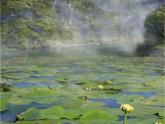The prestigious scientific journal Nature published on its Scientific Reports the discovery of the first fossil remains of amphibians in Antarctica. This finding, in which the geologist of the Argentine Antarctic Institute (IAA) Marcelo Reguero participated, reveals the existence of a warm to temperate climate in the Antarctic Peninsula approximately 40 million years ago.
These environmental conditions are comparable with the humid and temperate environments of the mountain forests of South America where these anurans currently live. That information is temporarily coincident with the final break-up of the Gondwana supercontinent.
The fossils belong to the Calyptocephalellidae family (anurans) and were discovered in sediments with an age range between 40 and 45 million years old on Marambio Island. Field work was carried out in 2011 and 2013 by paleontologists from the Argentine Antarctic Institute, under the Ministry of Foreign Affairs, and from the Swedish Museum of Natural History in Stockholm in international collaboration.
Upon receiving this news, the Secretary of the Malvinas, Antarctica and the South Atlantic, Daniel Filmus, expressed “enormous pride in the work and effort that our scientists make in Antarctica” and stressed that “the Argentine Antarctic Institute is the first scientific institution of the world dedicated exclusively to the study of that continent and since its creation in 1951, it has been committed to national sovereignty, international cooperation, peace and environmental protection”.
About the Argentine Antarctic Institute
For 69 years, the Argentine Antarctic Institute has been in charge of defining, directing, managing, coordinating and disseminating Argentina's technical-scientific activity in Antarctica, to support the rights and interests of the Argentine State in that continent.
The IAA conducts research in a variety of scientific fields, for example those that develop knowledge of the biodiversity of the micro- and macro-organisms of the different Antarctic ecosystems and how such diversity is affected by the growing phenomenon of climate change; the dynamics of atmospheric and oceanographic phenomena, as well as the degree of impact that human activity cause on Antarctic environments; the geological history of the Antarctic Peninsula, its paleobiology and the dynamics of its glaciers; social sciences and the enhancement of Antarctic historical heritage or the operation of the Multidisciplinary Laboratories located in the different bases.
For 69 years, both in the two bases administered by the National Directorate of Antarctica and in those operating under the orbit of the Antarctic Joint Command of the Ministry of Defense, numerous Argentine scientists from all branches of science, supported by technical and logistical personnel, have contributed to generating a tradition that is recognized today not only at the national level, but also internationally, through the innumerable agreements and cooperation works that the IAA has established and continues to carry out.
Starting in 1970, the IAA began to work in coordination with the National Directorate of Antarctica and since 2003, both agencies report to the Ministry of Foreign Affairs, International Trade and Worship. Since December 2019 the Institute has been under the orbit of the Secretariat of the Malvinas, Antarctica and the South Atlantic of the Ministry of Foreign Affairs, which was given that status back by President Alberto Fernández.
Throughout its history, the IAA leaded important scientific discoveries in various disciplines. In recent decades, the epicenter of activities has moved towards the Carlini Base, where the disciplines of biology, physicochemistry and oceanography stand out, with a focus on biodiversity and the effects of climate change. The works of geology, paleontology, glaciology and archeology in the camps settled near the Marambio Base also stand out, together with the study of the upper atmosphere.
Thanks to its network of Multidisciplinary Laboratories in all the Argentine permanent bases, the IAA maintains a scientific activity throughout Argentine Antarctica, committed to sovereignty, international cooperation, peace and environmental protection.


